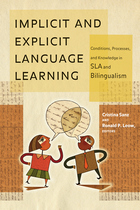
The Art of Teaching Spanish explores in-depth the findings of research in second language acquisition (SLA) and other language-related fields and translates those findings into practical pedagogical tools for current—and future—Spanish-language instructors. This volume addresses how theoretical frameworks affect the application of research findings to the teaching of Spanish, how logistical factors affect the way research findings can be applied to teach Spanish, and how findings from Spanish SLA research would be applicable to Spanish second language teaching and represented in Spanish curricula through objectives and goals (as evidenced in pedagogical materials such as textbooks and computer-assisted language learning software).
Top SLA researchers and applied linguists lend their expertise on matters such as foreign language across curriculum programs, testing, online learning, the incorporation of linguistic variation into the classroom, heritage language learners, the teaching of translation, the effects of study abroad and classroom contexts on learning, and other pedagogical issues. Other common themes of The Art of Teaching Spanish include the rejection of the concept of a monolithic language competence, the importance of language as social practice and cultural competence, the psycholinguistic component of SLA, and the need for more cross-fertilization from related fields.

Over the last several decades, neuroscientists, cognitive psychologists, and psycholinguists have investigated the implicit and explicit continuum in language development and use from theoretical, empirical, and methodological perspectives. This book addresses these perspectives in an effort to build connections among them and to draw pedagogical implications when possible.
The volume includes an examination of the psychological and neurological processes of implicit and explicit learning, what aspects of language learning can be affected by explicit learning, and the effects of bilingualism on the mental processing of language. Rigorous empirical research investigations probe specific aspects of acquiring morphosyntax and phonology, including early input, production, feedback, age, and study abroad. A final section explores the rich insights provided into language processing by bilingualism, including such major areas as aging, third language acquisition, and language separation.

How do people learn nonnative languages? Is there one part or function of our brains solely dedicated to language processing, or do we apply our general information-processing abilities when learning a new language? In this book, an interdisciplinary collaboration of scholars and researchers presents an overview of the latter approach to adult second language acquisition and brings together, for the first time, a comprehensive picture of the latest research on this subject.
Clearly organized into four distinct but integrated parts, Mind and Context in Adult Second Language Acquisition first provides an introduction to information-processing approaches and the tools for students to understand the data. The next sections explain factors that affect language learning, both internal (attention and awareness, individual differences, and the neural bases of language acquisition) and external (input, interaction, and pedagogical interventions). It concludes by looking at two pedagogical applications: processing instruction and content based instruction.
This important and timely volume is a must-read for students of language learning, second language acquisition, and linguists who want to better understand the information-processing approaches to learning a non-primary language. This book will also be of immense interest to language scholars, program directors, teachers, and administrators in both second language acquisition and cognitive psychology.
READERS
Browse our collection.
PUBLISHERS
See BiblioVault's publisher services.
STUDENT SERVICES
Files for college accessibility offices.
UChicago Accessibility Resources
home | accessibility | search | about | contact us
BiblioVault ® 2001 - 2024
The University of Chicago Press









